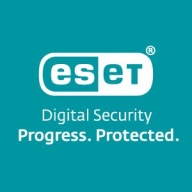

ESET Endpoint Protection Platform and Fortinet FortiClient are two popular cybersecurity solutions for businesses. Despite ESET's strength in threat detection, FortiClient's advanced features and better integration with other security tools make it a strong contender.
Features: ESET Endpoint Protection Platform is acclaimed for its effective malware detection, robust customization, and user-friendly management console. Fortinet FortiClient stands out with its superior threat intelligence, extensive VPN capabilities, and smooth integration with other Fortinet devices.
Room for Improvement: ESET Endpoint Protection Platform could benefit from better reporting capabilities, more intuitive management tools, and enhanced troubleshooting processes. Fortinet FortiClient requires improvement in its error handling, user interface, and reporting features.
Ease of Deployment and Customer Service: ESET Endpoint Protection Platform is typically easier to deploy, offering straightforward setup and consistent customer support. Fortinet FortiClient, while presenting a slightly more complex deployment, excels with responsive and knowledgeable customer service.
Pricing and ROI: ESET Endpoint Protection Platform is generally considered cost-effective with an attractive ROI for businesses of various sizes. Fortinet FortiClient, though potentially more expensive, is seen as worth the investment due to its robust features and enhanced security measures.
Normally, I cannot give a ten for support of all brands, as it is not always possible to get full support from companies.
They initiate the troubleshooting process quickly and resolve issues in a timely manner.
Technical support can be logged on Fortinet's support portal.
They have room to improve by deploying more support resources.
In terms of scalability, I can rate it eight or nine out of ten.
I hope Fortinet will start an insider developer program where professionals can provide feedback on new releases to ensure improvements.
The scalability could use improvement as you need to ensure that routes and policies are aligned, which can be complex.
We can recommend FortiClient for small organizations with 50 to 60 users as well as for larger enterprises due to its extensive features.
In terms of stability, I can rate it at nine out of ten.
Its stability level is excellent.
A lightweight version of ESET might be beneficial as many of our clients have older CPUs and RAM.
The routing and policy need to be tailored between both to ensure proper functionality.
FortiClient needs improvement in restricting user information and ensuring more secure customer data to better protect source code and reduce the risk of security breaches.
There are advanced features like Zero Trust that I currently do not use but could be beneficial for security.
The pricing of ESET Endpoint Protection Platform is a bit high compared to other competitors.
FortiClient is a value-for-money product and is not considered expensive compared to similar products on the market.
Recently, Fortinet has increased prices for its products.
Justifying the price to clients can be difficult.
The primary purpose is to protect computers from viruses and ransomware.
We appreciate its VPN capabilities and the features that offer extra security functionalities like antivirus and malware scanning.
The most valuable feature of FortiClient is its high security level.
It enhances our business by allowing our agents to work remotely, which we had not been able to do before.


ESET Endpoint Protection Platform (EPP) is a cybersecurity solution designed to protect businesses of all sizes against a wide array of cyber threats. Its advanced technologies and user-friendly interface provide robust security for endpoint devices, such as desktops, laptops, and mobile devices, without compromising performance. ESET's approach combines multiple layers of protection, including traditional signature-based detection with advanced heuristic analysis, behavioral monitoring, and machine learning, to effectively counter both known and emerging threats.
ESET's Endpoint Protection Platform is based on a multi-layered defense strategy, which utilizes various technologies like cloud-based scanning, network attack protection, and exploit blockers. This strategy ensures solid protection against malware, ransomware, phishing attacks, and advanced persistent threats (APTs), offering businesses peace of mind regarding their digital security. ESET's platform protects computers, mobile devices, file servers and virtual environments. It’s available as a standalone product and as a part of a wider enterprise cybersecurity bundle, ESET PROTECT Enterprise, which also includes file server security, disk encryption, a cloud sandbox and EDR.
ESET PROTECT Advanced
The ESET PROTECT Advanced provides best-in-class endpoint protection against ransomware & zero-day threats, backed by powerful data security.
Performance and Compatibility
ESET is widely acclaimed for its light system footprint, ensuring that endpoint protection does not come at the expense of performance. This efficiency is crucial for maintaining operational productivity without sacrificing security. Moreover, ESET's solutions are compatible with a wide range of operating systems, including Windows, macOS, Linux, and Android.
Centralized Management
ESET Endpoint Protection Platform is managed via ESET Security Management Center, a centralized management console that provides real-time visibility into on-premise and off-premise endpoints. This simplifies the administration of security policies, streamlines the detection and response processes, and provides detailed reporting capabilities, making it easier for IT professionals to maintain a secure and compliant IT environment.
FortiClient is a fabric agent that delivers endpoint protection, endpoint compliance, and secure access in a single, lightweight, lightweight client, providing visibility, information, and control to your endpoints. In addition, it enables secure, remote connectivity to the security fabric. It also integrates network and endpoint with segmentation and automation. FortiClient enables unified endpoint awareness by sharing endpoint telemetry with the security fabric. It is compatible with third-party EDR (endpoint detection and response and anti-malware solutions.
The FortiClient fabric agent can:
• Report on the status of a device, including firmware version and applications running.
• Send all suspicious files to a fabric sandbox.
• Enforce USB control, application control, URL filtering, and firmware upgrade policies.
• Provide application firewall service and malware protection.
• Enable devices to connect securely to the security fabric over either ZTNA tunnels or VPN (IPsec or SSL), both encrypted. The connection to the security fabric can be either a SASE service or a FortiGate next-generation firewall.
You can purchase FortiClient with one of three levels of capability:
Zero Trust security - The ZTNA edition enables both VPN and ZTNA encrypted tunnels, as well as USB device control and URL filtering.
Endpoint security - The EPP/APT edition adds AI-based NGAV (next-generation antivirus), application firewall, endpoint quarantine, and support for cloud sandbox.
Cloud-based endpoint security
Benefits and Features
• Fabric agent leverages integrations and provides telemetry information to the rest of the Fortinet security fabric.
• SAAS control and web/content filtering
• Dynamic access control helps with automation and simplifies compliance.
• Software inventory management enables visibility as well as management of licenses.
• Automated response detects and isolates any endpoints that may be compromised.
• ZTNA delivers better remote access and consistent application access policies
• Managed endpoint security services remotely assist with setup, configuration, deployment, vulnerability monitoring, and overall monitoring of endpoint security.
Reviews from Real Users:
PeerSpot users like that FortiClient is easy to use and integrates well with other solutions. They also appreciate the richness of its features and find it to be inexpensive in comparison to other products that require separate purchases for separate features.
We monitor all Endpoint Protection Platform (EPP) reviews to prevent fraudulent reviews and keep review quality high. We do not post reviews by company employees or direct competitors. We validate each review for authenticity via cross-reference with LinkedIn, and personal follow-up with the reviewer when necessary.